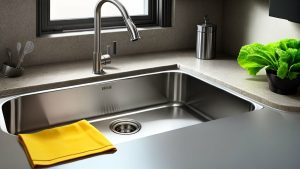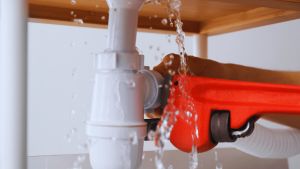Ants are prevalent pests that often infiltrate residential kitchens., making preparing food and maintaining cleanliness challenging. Sometimes, it may feel like ants keep returning no matter what you do. However, with the proper knowledge and techniques, it is possible to bid farewell to ants on your kitchen counter for good.
This section will discuss practical techniques to eliminate ants from your kitchen counter and provide tips and tricks for ant control. By implementing these strategies, you can ensure an ant-free kitchen and a comfortable living environment.
Key Takeaways:
- Understanding ant behavior and infestation signs is crucial for effective ant control.
- Diy ant removal methods, natural repellents, and sealing entry points effectively prevent ant infestation.
- Maintaining a clean kitchen is key to preventing ants on kitchen countertops.
- Hiring professional ant extermination services, including the kitchen counter, can eliminate ants from your home.
- Consistent maintenance is necessary to ensure your kitchen counter remains ant-free.
Understanding Ant Behavior and Infestation Signs
Before we dive into the various ant control methods, it’s important to understand the behavior of ants and the signs of an infestation in your kitchen. Ants are social insects that live in colonies with a well-defined hierarchy. The worker ants are responsible for foraging food and returning it to the colony. These are the ants that you typically see on your kitchen counter.
Ants use chemical signals called pheromones to communicate with each other and create trails to food sources. If you see a line of ants moving back and forth on your counter, they likely have found a food source and are communicating its location to the rest of the colony.
Some common signs of an ant infestation in your kitchen include:
- Ant trails on your kitchen counter or floor
- Small piles of dirt or debris near cracks or crevices
- Ant nests in nearby outdoor areas
- Strange rustling or buzzing noises coming from your walls
Now that you know what to look for, let’s explore some natural remedies for ant infestation and effective ways to eliminate ants in the kitchen.
DIY Ant Removal Methods
You can try several DIY ant control methods when getting rid of ants on your kitchen counter. These methods are practical, easy to implement, and can help you save money on professional extermination services.
| DIY Method | Description |
|---|---|
| Baiting | Place ant bait stations near entry points and areas where ants are most active. The bait attracts the ants, carrying it back to their colony, effectively exterminating the entire colony. |
| Vinegar Solution | Make a solution of equal parts vinegar and water, and spray it directly on the ants. The vinegar disrupts the ants’ pheromone trails, making it difficult for them to navigate and communicate with one another. |
| Dish Soap Solution | Mix a few drops of dish soap with water and spray them on the ants. The soap suffocates the ants by blocking their breathing pores. |
| Boric Acid Solution | Mix boric acid with sugar and water to form a paste, then place it near ant entry points. The sugar attracts the ants, and the boric acid exterminates the colony. |
It’s important to note that these methods may take some time to show results, so patience is key. Additionally, always follow safety precautions when handling chemicals, and keep them out of reach of children and pets.
Maintaining a Clean Kitchen to Prevent Ants
To prevent ant infestation on your kitchen countertops, it is crucial to maintain a clean kitchen. Ants are attracted to food, so any crumbs or spills on your counter will attract them.
Here are some tips to keep your kitchen ant-free:
- Clean your countertops regularly with soap and water.
- Wipe down your counters after every use.
- Store food in airtight containers.
- Take out the trash regularly.
- Do not leave dirty dishes in the sink overnight.
These simple steps can significantly reduce the likelihood of ants infesting kitchen countertops. Prevention is critical to keeping your kitchen ant-free.
Using Natural Repellents to Deter Ants
If you prefer natural remedies to chemical ant repellents, several options are available to deter ants from your kitchen counter.
Vinegar: Vinegar and water sprayed onto kitchen surfaces can effectively repel ants. Additionally, wiping down kitchen counters with vinegar-infused water can mask the scent trails left by ants, making it difficult for them to navigate to your food.
Peppermint Oil: Ants are naturally deterred by peppermint oil. Mix a few drops of peppermint essential oil with water and spray around your kitchen to keep ants at bay.
Cinnamon: Cinnamon is also a natural ant-repellent. Place cinnamon sticks around your kitchen or sprinkle cinnamon around entry points to prevent ants from entering.
Lemon Juice: Lemon juice can be used to repel ants. Squeeze fresh lemon juice onto kitchen surfaces or soak a sponge in lemon juice and wipe down counters to deter ants.
Diatomaceous Earth: Diatomaceous earth is a natural and non-toxic ant-repellent. Sprinkle a thin layer of diatomaceous earth around entry points and areas where ants are likely to travel, and watch as the tiny particles cut through the ants’ exoskeletons, causing them to dehydrate and die.
Sealing Entry Points to Keep Ants Out
Sealing entry points is an effective way to prevent ants from infesting your kitchen counter. Ants enter homes through cracks in walls, gaps in windows and doors, and other openings. Once they find a food source, they will return and create a colony.
First, inspect your kitchen for any openings or cracks where ants can enter. Common entry points include gaps around pipes, doors, and windows. Use caulk or weather stripping to seal these gaps and prevent ants from entering.
Another way to seal entry points is using a sugar and borax mixture. Ants are attracted to sugar, and borax is toxic to them. Mix equal parts sugar and borax and place the cross near the entry points. As the ants feed on the sugar, they will also ingest the borax and die.
Regularly inspecting your kitchen for openings and sealing them is important in preventing ant infestations on your countertops. By taking these preventive measures, you can enjoy an ant-free kitchen for a long time.
Professional Ant Extermination Services
If you have tried various DIY methods but are still struggling with an ant infestation in your kitchen, consider professional ant extermination services.
Professional exterminators have the expertise and equipment to eliminate ants from your home effectively. They can identify the source of the infestation, provide targeted treatments and use safe and suitable methods to eliminate ants without harming your family or pets.
Before hiring a professional ant extermination service, research and choose a reputable company that uses eco-friendly and safe methods. You can ask for referrals from friends and family or check online reviews to find a reliable service provider.
Professional and extermination services may come at a higher cost, but they can be a worthwhile investment in the long run. By eliminating the root cause of the problem, you can prevent the ants from returning and causing further damage to your kitchen.
Ant-Free Kitchen Solutions
Prevention is key to maintaining an ant-free kitchen. Here are some long-term solutions to consider:
- Regular Cleaning: Keep your kitchen counter and surrounding areas clean, especially after cooking and dining. Crumbs and spills attract ants, so regularly wipe down surfaces with soap and water.
- Proper Food Storage: Store your food in airtight containers to prevent easy access for ants. Avoid leaving open food containers on the counter or in cabinets.
- Sealing Entry Points: Inspect your kitchen for potential entry points, such as gaps around windows, doors, and pipes. Seal these gaps with caulk or weatherstripping to prevent ants from entering.
- Natural Repellents: Use natural repellents such as vinegar, lemon juice, peppermint oil, or cinnamon to deter ants from approaching your kitchen counter.
- Regular Maintenance: Even after implementing preventive measures, you must continue monitoring and maintaining your kitchen to keep it ant-free. Regularly inspect for signs of an infestation and take immediate action if necessary.
By incorporating these solutions into your routine, you can keep your kitchen counter and surrounding areas free from ants and prevent future infestations.
Dealing with Specific Types of Ants
While many types of ants can invade your kitchen, some of the most common include:
| Type | Behavior | Treatment |
|---|---|---|
| Argentine Ants | They leave a trail of pheromones, making it easy for other ants to follow. | Use ant baits or sprays, and seal off entry points into your kitchen. |
| Carpenter Ants | They burrow into wood and can cause structural damage. | Use insecticide dust or bait to treat nests and repair any damaged wood. |
| Pavement Ants | They prefer to build nests in cracks or pavement. | Use bait or insecticide, and seal any cracks or openings in your kitchen. |
If you are dealing with a specific type of ant, it is important to tailor your treatment approach accordingly. Natural remedies, such as placing bay leaves or cloves near ant entry points, can also deter certain types of ants.
By identifying the specific type of ant infesting your kitchen and using targeted treatment methods, you can eliminate them and prevent them from returning.
Maintaining an Ant-Free Kitchen Counter
Now that you have successfully bid farewell to ants on your kitchen counter, it is important to maintain it to prevent future ant infestations. Here are some tips to keep your kitchen counter ant-free:
- Clean up spills and crumbs immediately: Ants are attracted to food particles left behind on your kitchen counter. To prevent them from returning, clean up any spills or crumbs immediately.
- Store food properly: Store food in sealed containers to prevent ants from being attracted to it. This includes pet food as well.
- Empty your trash regularly: Ants are attracted to the smell of garbage. Make sure you empty your trash regularly and keep your trash can clean to prevent ants from being attracted to it.
- Seal entry points: Seal any cracks or holes in your kitchen counter or walls to prevent ants from entering your home.
- Use natural repellents: Consider using natural repellents such as vinegar, cinnamon, or peppermint oil to deter ants from approaching your kitchen counter. These natural remedies are safe for both humans and pets.
- Maintain your kitchen: Regularly deep clean your kitchen to prevent ant infestations. This includes wiping down your counters, sweeping and mopping the floors, and cleaning your appliances.
Regularly maintaining your kitchen counter and following these tips can keep your kitchen ant-free and prevent future ant infestations.
Conclusion
We hope this article has provided valuable insights into bidding farewell to ants on your kitchen counter. Implementing the tips and tricks discussed can help you effectively control ant infestation and prevent them from returning. Remember, understanding and behavior and identifying entry points are crucial to maintaining an ant-free kitchen and regular cleaning and maintenance.
If all else fails, do not hesitate to seek professional ant extermination services to eliminate the infestation from your home. With these solutions, you can enjoy a clean, ant-free kitchen counter and home.
FAQ
Q: How can I bid farewell to ants on my kitchen counter?
A: You can use several effective techniques to eliminate ants from your kitchen counter. These include using natural repellents, sealing entry points, maintaining a clean kitchen, and seeking professional ant extermination services. By implementing these methods, you can eliminate and prevent ants from returning.
Q: What are the signs of ant infestation in my kitchen?
A: Some common signs of ant infestation in your kitchen include ant trails, food debris, or crumb accumulation, particularly near countertops and pantry areas. You may also notice increased ants in and around your kitchen. If you spot these signs, it is essential to take immediate action to prevent further infestation.
Q: Are there any natural remedies to eliminate ants in the kitchen?
A: Natural remedies can effectively help you eliminate ants in your kitchen. Some popular natural remedies include vinegar, lemon juice, cinnamon, or essential oils like peppermint or tea tree oil. These natural repellents can deter and discourage ants from approaching your kitchen counter.
Q: How can I remove ants from my kitchen counter?
A: If you prefer a DIY approach, there are several methods you can use to remove ants from your kitchen counter. These include creating homemade ant traps using borax and sugar, placing ant baits, or using dish soap and water to clean the counter and disrupt ant trails. Following these step-by-step instructions can help you effectively exterminate ants.
Q: How can I prevent ants from infesting my kitchen countertops?
A: Keeping a clean kitchen is key to preventing ant infestation on your countertops. Make sure to clean up food spills promptly, store food in airtight containers, and take out the trash regularly. Additionally, sealing entry points such as cracks or gaps in windows, doors, and walls can help prevent ants from entering your kitchen.
Q: Are there any natural repellents that can deter ants?
A: Natural repellents can effectively deter ants from approaching your kitchen counter. Some examples include using vinegar, essential oils like peppermint or lavender, or creating a mixture of water and citrus peels. These natural repellents can be applied to areas where ants tend to appear, creating a deterrent effect.
Q: How do I seal entry points to prevent ants from entering my kitchen?
A: To seal entry points, carefully inspect your kitchen for cracks, gaps, or openings where ants can enter. Use caulk or weatherstripping to seal these areas, paying close attention to windows, doors, baseboards, and pipes. You can effectively keep ants out of your kitchen by eliminating these entry points.
Q: Should I consider professional ant extermination services?
A: If the ant infestation on your kitchen counter persists despite your efforts, it may be beneficial to consider professional ant extermination services. Professionals have the expertise and resources to eliminate ants from your home effectively. They can assess the severity of the infestation, identify the ant species, and use targeted treatments for optimal results.
Q: How can I maintain an ant-free kitchen in the long term?
A: To maintain an ant-free kitchen long-term, it is essential to implement preventive measures and practice ongoing maintenance. This includes regularly cleaning your kitchen, storing food properly, sealing entry points, and using natural repellents. By consistently following these tips, you can ensure your kitchen remains ants-free.
Q: How do I deal with specific types of ants that infest kitchen countertops?
A: Different types of ants may require specific control methods. For example, using sweet bait can be effective if you are dealing with sugar ants. If you have carpenter ants, finding and treating their nest is crucial. Research the specific ant species and follow targeted control methods and natural remedies tailored to that particular type of ant.
Q: What ongoing maintenance should I perform to keep my kitchen counter ant-free?
A: To keep your kitchen counter ant-free, it is important to perform ongoing maintenance. This includes regularly cleaning your counter, wiping away food debris or spills immediately, storing food properly, and conducting regular inspections for signs of ants or potential entry points. By staying vigilant, you can ensure an ant-free kitchen counter.

It’s me, Amber Hayden, the heart and soul behind SagarmathaOnlineMedia.com. From a young age, I’ve been head over heels for everything home-related, from interior decor to gardening. I’m the type who can’t resist a well-crafted piece of furniture, and I firmly believe that a home isn’t complete without a pet or two. But it’s not just about creating pretty spaces for me. I’m all about making homes that tell a story reflecting the people living there. SagarmathaOnlineMedia.com is my way of sharing this passion with you. Whether you’re looking for tips to jazz up your living room, advice on pet care, or ideas to make your garden bloom, I’m here to help. So, let’s embark on this journey together and make your house a home!



